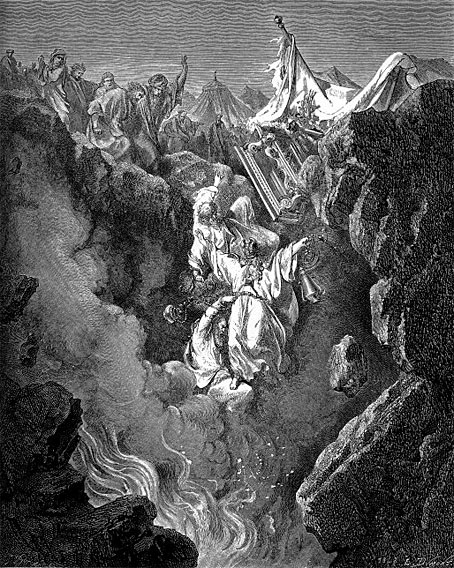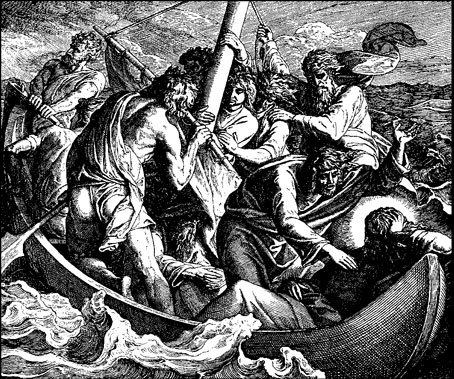Jul
26
2009

My friend Matt has been blogging about how postmodernism, with its openness to narrative, is a great opportunity for the gospel. But evangelicals need to sort themselves out first. Otherwise, to the world, they are just a bunch of Patsys. Patsy Biscoes that is.
Continue reading
4 comments | tags: Archaeology, Compromise, Gnosticism, Ideology, James Jordan, Liberal theology, N. T. Wright | posted in Apologetics, Biblical Theology
Jul
21
2009
“When you drink wine [at Communion] you are volunteering for death; you are accepting martyrdom.”
– James Jordan, Worship Lectures 2009
Comments Off | tags: Communion, James Jordan | posted in Quotes
Jul
15
2009
or Limited Redemption

“For if we sin wilfully after that we have received the knowledge of the truth, there remaineth no more sacrifice for sins” - Hebrews 10:26
NOTE: THIS POST HAS BEEN REMIXED AND INCLUDED IN GOD’S KITCHEN.
Did Christ die for all? If Jesus’ blood was not shed for all, how can it possibly be a sin to “trample it underfoot” as the unbelieving Jews did? (Hebrews 10:29)
Elijah set up a 12 stone altar as a substitute for Israel. The sacrifice ascended to the Lord (goat #1) and the prophets were slain (goat #2). Thus, the Baal worship was atoned for.
But Jezebel trampled this sacrifice underfoot, and continued in sin. In retaliation, she slew the prophets that Obadiah had hidden. Consequently she was trampled underfoot. (2 Kings 9:33).
The New Testament history, including the Revelation, follows this pattern. Jesus set up a new 12 apostle priesthood and Israel slew Him and them. Consequently, Israel was slain, as Jezebel. That is the context of the Hebrews passage, and the meaning of the harlot of Babylon.
Continue reading
Comments Off | tags: Ark of the Covenant, Atonement, Calvinism, High Priest, James Jordan, Jezebel, Postmillennialism, Revelation | posted in Biblical Theology, The Last Days
Jul
7
2009
“The point is, we had this relationship the Law. The Law was our husband—over us—and we were bound by the Law through the angels. Now, what died? The Law didn’t die. We died. We died in Christ, and that was the end of that relationship to the Law. It snapped that Covenant string… It was like a rubber band. When we tried to get away from it, it snapped back. But now it’s gone, because we died. Now we’ve come back to life and there is a string joining us to Jesus. We are married to somebody else. That’s the picture.
The Law is still there, but it’s no longer our husband. It’s our tool. We are no longer under Law. We are over Law and we use the Law as a tool.
Continue reading
Comments Off | tags: James Jordan, Postmillennialism, Romans, The Law | posted in Christian Life, Ethics, Quotes
Jul
5
2009

You can listen to a 2009 series of lectures on worship by James Jordan here.
They will make you cry for the lack of Bible content (and understanding) in teaching today, and laugh at what gets passed off as instruction for better worship.
If many of the things he says sound bizarre, it’s because he’s being biblical. It’s Bible-strange, but it’s we who are estranged. He’ll give you enough to chew on for decades, and you’ll realise how deficient, gnostic, watered-down and compromised even the best of modern theology is.
But these are a sumptuous feast for worship leaders, in fact, anyone in church leadership. Go on, I dare you.
6 comments | tags: James Jordan, Worship | posted in Biblical Theology
Jul
1
2009
“Because of 18th century rationalism in our culture, we are the heirs of a tradition of thinking that downplays symbolism in communication. The assumption is that all truth comes in the categories of philosophical statements. We are very much at home reading St Paul because he uses abstract language: justification; sanctification; glorification; propitiation… We think that this is the best way to communicate and nail things down.
But this is not the way God communicates. God communicates in parables as well as abstract ideas. God communicates in architectural forms, in proverbs, in songs. God’s way of educating young people is the Proverbs. Our way is to make them memorise a list of abstract nouns. That’s what the Shorter Catechism is. The Proverbs have a different way of communicating, a way that is much more holistic. It strikes the human personality at a deeper level.”
–James B. Jordan, The Bible as Picture, Basilean Lectures 1990.
Comments Off | tags: James Jordan, Paul, Proverbs, Rationalism | posted in Biblical Theology, Quotes
Jun
30
2009
 “And their dead bodies will lie in the street of the great city which spiritually is called Sodom and Egypt, where also our Lord was crucified.” – Revelation 11:8
“And their dead bodies will lie in the street of the great city which spiritually is called Sodom and Egypt, where also our Lord was crucified.” – Revelation 11:8
Revelation 20 makes it clear that the “second death” is the lake of fire. But an analysis of the literary structure of Revelation brings out an interesting factor.
Continue reading
Comments Off | tags: Against Hyperpreterism, Armageddon, Atonement, Azal, Egypt, Feasts, James Jordan, Passover, Peter Leithart, Revelation 20, Smyrna, Sodom, Systematic typology, Tabernacle | posted in Biblical Theology, The Last Days, Totus Christus
Jun
29
2009
“If you’re a pastor and you want your people to hear the hard things you have to say, you’ve got to give them your flesh and your blood. Jesus gave His to earn the right to a hearing. People will hear what you have to say when they see that you bleed for them and that you give them yourself.”
–James B. Jordan, The Bible as Literature, Basilean Lectures 1990.
Comments Off | tags: James Jordan, Preaching | posted in Christian Life, Quotes
Jun
25
2009
 “Let no one deceive you by any means; for that Day will not come unless the falling away comes first, and the man of sin is revealed, the son of perdition.” (2 Thessalonians 2:3)
“Let no one deceive you by any means; for that Day will not come unless the falling away comes first, and the man of sin is revealed, the son of perdition.” (2 Thessalonians 2:3)
Non-dispensationalists are often accused of “Replacement Theology,” that is, the church replaced Israel. But we find in the Old Testament many examples of the same process prefiguring what the people of God went through in the first century. It is not replacement, but transformation.
Continue reading
Comments Off | tags: Aaron, AD70, Caleb, Ezra, James Jordan, Judaisers, Korah, Moses | posted in Biblical Theology, Quotes, The Last Days
Jun
22
2009

James Jordan writes:
High culture naturally self-destructs apart from true faith. Lacking a true sabbath context, the increase of leisure time in high cultures eventuates in high amounts of psychic stress, decadence, and homosexuality. We see this in America today. Unless a high city culture is founded in the Biblical principles of true worship and free labour, it will collapse under its own decadence.1
Continue reading
Comments Off | tags: Adam, Contentment, Culture, James Jordan, Peter | posted in Christian Life































